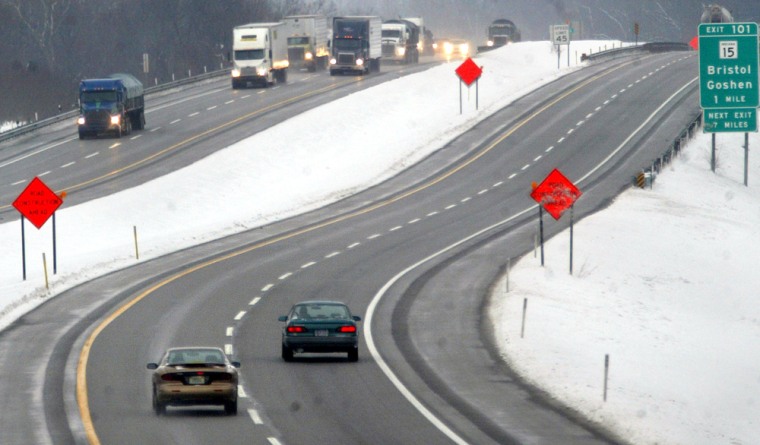Sweeping past Indiana’s steel mills and corn and soybean fields, the 157-mile Indiana Toll Road is often called the “Main Street of the Midwest” for its strategic role in linking the East Coast to Chicago and points west.
Now the highway across the heartland could fall into private hands.
Indiana officials hope to sign a lease this spring with a Spanish-Australian partnership that would operate the toll road for a profit for the next 75 years.
The company would keep all toll revenue. In return, it would be responsible for maintenance, improvements and other operating costs, and would pay the state $3.85 billion up front — money that would go toward other road and bridge projects.
If state lawmakers approve the deal, it would be the biggest highway-privatization in the country and could embolden other states to enter into similar arrangements.
'Louisiana Purchase of our time'
“At last, we can stop dreaming and start digging,” Gov. Mitch Daniels said last week. The Republican has hailed the transaction as “the Louisiana Purchase of our time for Indiana.”
Privately operated toll roads are slowly catching on in the United States after decades of popularity in Europe and, more recently, South America, Australia and other nations. The roads are attractive to investors because they offer long-term, stable revenue from tolls.
Last year, Chicago became the first U.S. government entity to lease an existing tollway to private investors. The city turned over the 7.8-mile Chicago Skyway to the same Spanish-Australian consortium for 99 years in exchange for $1.83 billion.
By this fall, about 30 of the 5,244 miles of U.S. toll roads will be run by private operators — the Chicago Skyway, the Dulles Greenway in northern Virginia and the South Bay Expressway, expected to open this fall near San Diego, said Patrick Jones, executive director of the International Bridge, Tunnel and Turnpike Association.
Jones said public-private tollways offer a solution to the United States’ “grossly underfunded” transportation infrastructure. Over the past 20 years, such partnerships have spent about $42.1 billion on 73 road projects in the U.S., according to the Federal Highway Administration.
Lack of profits
The 50-year-old Indiana Toll Road had 55 million paying customers last year but lost money five of the last seven years, including about $16 million in 2005, largely because the state has not mustered the political will to raise the tolls in more than 20 years.
Under the proposed agreement, Cintra of Madrid, Spain, and Macquarie Infrastructure Group of Sydney, Australia, would invest about $700 million in the tollway over nine years. That would go toward repaving, the adding of a third lane along one stretch, and the introduction of an electronic toll collection system. The consortium also would pay for state police to patrol the highway.
Macquarie chief executive Stephen Allen said the toll road and its customers would benefit from “having some private-sector discipline.”
The plan came up for debate in the Indiana House on Wednesday. It faces a Thursday deadline to move out of the House and on to the Senate.
Opponents worry that tolls could rise sharply or that road maintenance would suffer.
Exempt from toll hike under privatization
Tolls are already set to go up under an unrelated plan, jumping from $4.65 to $8 for cars this year, and more than doubling to $32 for big trucks by 2009. Under the privatization plan, however, people living in the seven counties that the highway traverses would be exempted from the toll hike and would be spared any increase for 10 years.
Indiana House Democrats also say it is bad public policy to sell off or lease a major public asset to a private venture, particularly a foreign one. They note that the venture could recoup its investment in 17 years, then make $21 billion in profits over the next 58 years.
“That is money that could go to our children, our grandchildren and our great-grandchildren,” said House Minority Leader Patrick Bauer of South Bend. Republicans control both chambers of the legislature.
State officials say the agreement sets limits on toll increases and allows the state to take control of the toll road in an emergency. “Should the United States declare war on Australia, we can take the road back immediately,” Indiana Budget Director Chuck Schalliol joked.
Peter Samuel, editor of Toll Roads News, an online trade publication, said private companies have financial incentives to provide good service at a reasonable price.
“They’ve got to be very mindful of providing the motorist with value for their money, or they’re not going to get their business,” he said.
